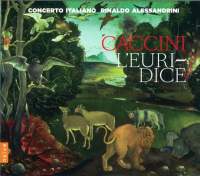Texte paru dans: / Appeared in:
*

GRAMOPHONE (05/2014)
Pour s'abonner /
Subscription information
Naïve
OP30552

Code-barres / Barcode : 0709861305520
(ID383)
Reviewer: David Vickers
The birth of opera can be traced back to a few significant landmark events in Florence,
such as Giulio Caccini’s Euridice. Ottavio Rinuccini’s libretto had already been set to music by Jacopo Peri for the entertainments that celebrated the marriage of Maria de’ Medici to Henry IV of France in October 1600, although the actual performance featured interpolated airs and choruses by Caccini (and were sung by his pupils). Thereafter, local rivals Caccini and Peri scrambled to claim pre-eminence by trying to get their own independent settings of Euridice published first; Caccini won the race when his score appeared in January 1601, just a few weeks before Peri’s score was printed. However, Caccini’s setting was not actually heard until a performance at the Palazzo Pitti on December 5, 1602, and its reception was overshadowed by the prior success of Peri’s version. Nonetheless, Caccini’s score is certainly the outright winner when it comes to the 21st-century discography; Scherzi Musicali’s landmark recording is now followed by Concerto Italiano’s live version recorded at last summer’s Innsbruck Early Music Festival.
Silvia
Frigato’s contributions are sweetly endearing (Euridice doesn’t actually do much
but Frigato also sings La Tragedia’s short prologue). However, Furio Zanasi’s
ardent Orfeo is not a convincing proponent of the ‘sweet notes and such
melodious strains’ of which Plutone accuses him; the smoky and forthright
delivery of the grieving hero’s desperate song in the underworld does not seem
beguiling enough to be considered Orphic in quality (although his declamation of
poetry is never less than vivid). Gianpaolo Fagotto bellows through Arcetro’s
numerous lines using velocity rather than the poetry. Most other experienced
singers are highly effective in their brief solo monodies and in a few quasi-madrigalian
choruses (usually refrains that are reiterated during scenes). Alessandrini and
his continuo colleagues ensure the drama zips along at an intensive pace,
although the battery of full-frontal plucking wears thin after a while. Softer
seductiveness might help Caccini’s value to emerge more engagingly.
Fermer la fenêtre/Close window
Cliquez l'un ou l'autre
bouton pour découvrir bien d'autres critiques de CD
Click either button for many other reviews


